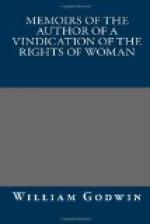The present situation of Mary, of necessity produced some further intercourse between her and Mr. Imlay. He sent a physician to her; and Mrs. Christie, at his desire, prevailed on her to remove to her house in Finsbury-square. In the mean time Mr. Imlay assured her that his present was merely a casual, sensual connection; and, of course, fostered in her mind the idea that it would be once more in her choice to live with him. With whatever intention the idea was suggested, it was certainly calculated to increase the agitation of her mind. In one respect however it produced an effect unlike that which might most obviously have been looked for. It roused within her the characteristic energy of mind, which she seemed partially to have forgotten. She saw the necessity of bringing the affair to a point, and not suffering months and years to roll on in uncertainty and suspence. This idea inspired her with an extraordinary resolution. The language she employed, was, in effect, as follows: “If we are ever to live together again, it must be now. We meet now, or we part for ever. You say, You cannot abruptly break off the connection you have formed. It is unworthy of my courage and character, to wait the uncertain issue of that connexion. I am determined to come to a decision. I consent then, for the present, to live with you, and the woman to whom you have associated yourself. I think it important that you should learn habitually to feel for your child the affection of a father. But, if you reject this proposal, here we end. You are now free. We will correspond no more. We will have no intercourse of any kind. I will be to you as a person that is dead.”
The proposal she made, extraordinary and injudicious as it was, was at first accepted; and Mr. Imlay took her accordingly, to look at a house he was upon the point of hiring, that she might judge whether it was calculated to please her. Upon second thoughts however he retracted his concession.
In the following month, Mr. Imlay, and the woman with whom he was at present connected, went to Paris, where they remained three months. Mary had, previously to this, fixed herself in a lodging in Finsbury-place, where, for some time, she saw scarcely any one but Mrs. Christie, for the sake of whose neighbourhood she had chosen this situation; “existing,” as she expressed it, “in a living tomb, and her life but an exercise of fortitude, continually on the stretch.”
Thus circumstanced, it was unavoidable for her thoughts to brood upon a passion, which all that she had suffered had not yet been able to extinguish. Accordingly, as soon as Mr. Imlay returned to England, she could not restrain herself from making another effort, and desiring to see him once more. “During his absence, affection had led her to make numberless excuses for his conduct,” and she probably wished to believe that his present connection was, as he represented it, purely of a casual nature. To this application, she observes, that “he returned no other answer, except declaring, with unjustifiable passion, that he would not see her.”




